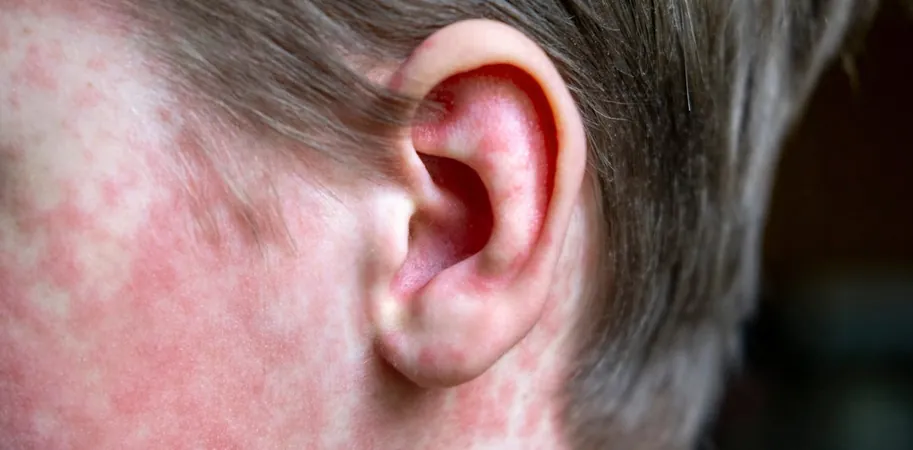
Tragic Loss: Child Dies from Rare Measles Complication Years After Infection!
2025-09-15
Author: Siti
In a heartbreaking incident from Los Angeles, a school-age child has succumbed to a severe brain complication linked to measles, shedding light on the alarming ramifications of decreasing vaccination rates.
This child, who was not old enough for the measles vaccine, developed subacute sclerosing panencephalitis (SSPE), a progressive and nearly always fatal brain disorder that surfaces years after a measles infection.
SSPE strikes approximately one in every 10,000 people infected with measles, and that risk skyrockets to one in 600 for infants infected before their first birthday. The condition leads to extensive brain scarring and inflammation, typically emerging six to eight years post-infection.
Initial symptoms can be misleading, resembling learning difficulties or concentration issues. However, as time goes on, affected individuals experience rapid cognitive decline, uncontrollable jerking movements, and seizures. Despite attempts to manage the symptoms with antiviral and anti-inflammatory medications, nearly all patients succumb to the disease within five years.
This tragic scenario emphasizes the urgent concerns regarding measles outbreaks in areas where vaccination rates were once promising. The CDC has reported nearly 1,500 measles cases in the U.S. alone this year.
The Anti-Vaccine Epidemic: A Dire Legacy
The decline in vaccination rates has been fueled by fraudulent research linking the MMR vaccine to autism—myths perpetuated by a now-disgraced doctor and amplified by social media. This misinformation has been exacerbated by skepticism toward vaccines during the COVID-19 pandemic.
Before vaccination programs began in the 1960s, the UK reported between 100,000 and 800,000 measles cases annually. Globally, measles claimed around 2-3 million lives each year. It remains one of the most infectious viruses, with nine out of ten unvaccinated individuals contracting it upon exposure.
The measles vaccine, with an impressive 97% efficacy, has saved over 60 million lives worldwide between 2000 and 2023. High vaccination rates not only protect individuals but also create "herd immunity," safeguarding those too young to be vaccinated—like the child who tragically died.
Medical professionals can pinpoint SSPE through a combination of brain scans, electrical activity tests, and spinal fluid analyses to identify antibodies against the measles virus. However, treatment options are severely limited due to the rarity of the condition, stymieing large-scale clinical studies.
SSPE occurs when the measles virus lies dormant post-infection, later mutating and attacking brain cells, leading to irreversible brain damage and inflammation—hence the name 'panencephalitis.' Once common in developing nations, SSPE has become rare in areas with strong vaccination programs, but decreasing immunization rates threaten to reignite this and other preventable diseases.
Health officials warn that due to the significant time lag between measles infection and SSPE manifestation, more tragic cases may be on the horizon linked to current outbreaks. By the time SSPE becomes prevalent again, it may be too late to avert countless additional tragedies through vaccination.
The heartbreaking death in LA serves as a crucial reminder: measles is far from a harmless childhood illness. It can lead to severe complications, including pneumonia and, as this case tragically illustrates, delayed yet deadly brain damage.




 Brasil (PT)
Brasil (PT)
 Canada (EN)
Canada (EN)
 Chile (ES)
Chile (ES)
 Česko (CS)
Česko (CS)
 대한민국 (KO)
대한민국 (KO)
 España (ES)
España (ES)
 France (FR)
France (FR)
 Hong Kong (EN)
Hong Kong (EN)
 Italia (IT)
Italia (IT)
 日本 (JA)
日本 (JA)
 Magyarország (HU)
Magyarország (HU)
 Norge (NO)
Norge (NO)
 Polska (PL)
Polska (PL)
 Schweiz (DE)
Schweiz (DE)
 Singapore (EN)
Singapore (EN)
 Sverige (SV)
Sverige (SV)
 Suomi (FI)
Suomi (FI)
 Türkiye (TR)
Türkiye (TR)
 الإمارات العربية المتحدة (AR)
الإمارات العربية المتحدة (AR)